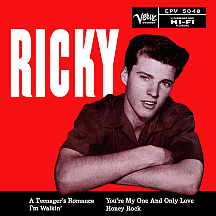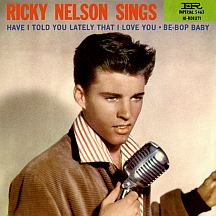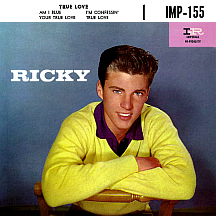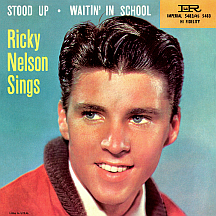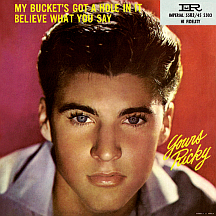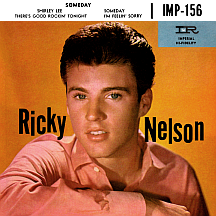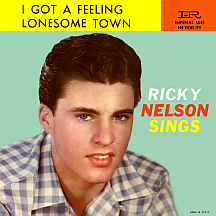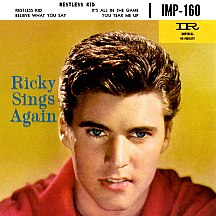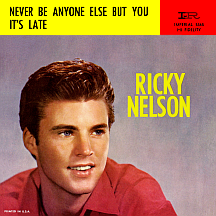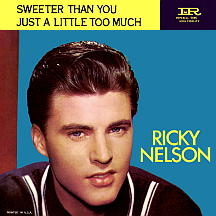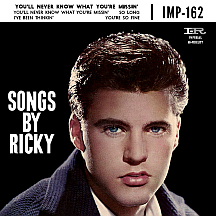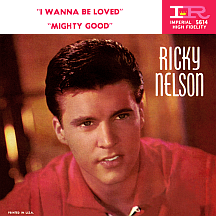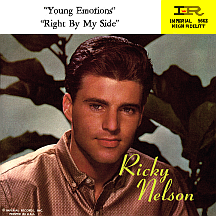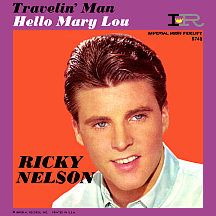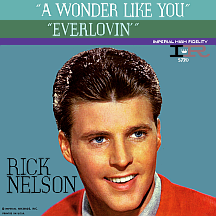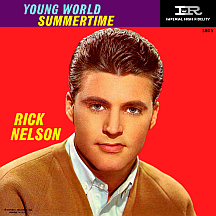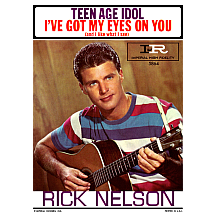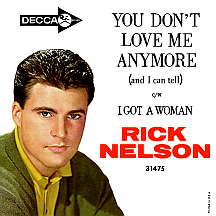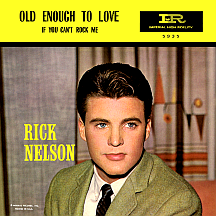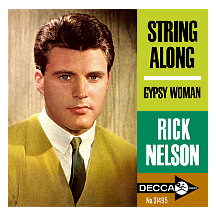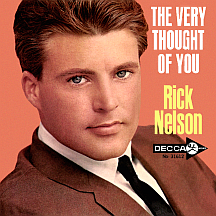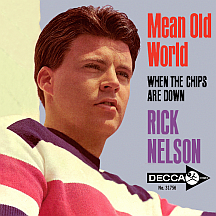RICKY NELSON
The Nelson family! That big showbiz clan headed by the apparently unemployed, easygoing but actually very business-savvy Ozzie Nelson. With a lovely wife, a brother, two sons, their wives and children, the idyllic 1950s family held a noteworthy niche in the entertainment industry, a comfort zone for many millions over a span of several decades. Eric Hilliard Nelson (nicknamed Ricky, he later shortened it to Rick) was the teen idol, the rock and roller, arguably the most talented, certainly the best remembered, though for the better part of two decades the entire family went about its somewhat real, somewhat fictionalized business where everyone could hear and, later, see.
Jersey City-born saxophonist, singer and bandleader Ozzie (real first name: Oswald) began making records for the Brunswick label in 1930. "I Still Get a Thrill," written by vaudeville singer Benny Davis and "Santa Claus is Comin' to Town" composer J. Fred Coots, was his first hit in the fall of that year, setting the stage for more than three dozen best sellers over the next ten years, including the August 1935 chart-topper "And Then Some," penned by Tot Seymour and Vee Lawnhurst (proclaimed "the first successful team of girl songwriters in popular music history" by their publishing company).
While Ozzie was the vocalist on a majority of his recordings, he found the apple of his eye in one Peggy Lou Snyder of Des Moines, Iowa, who'd had minor speaking roles in a few Paramount Pictures shorts; at first uncredited, she'd been using her professional name, Harriet Hilliard, by the time they met in 1932 when she promptly joined his band. The lovebirds married in '35 and Harriet enjoyed a sharp career upswing with a key role in the 1936 Fred Astaire-Ginger Rogers musical Follow the Fleet (a song from the movie, "But Where Are You?," was a Harriet-sung hit for Ozzie's orchestra). She sang on many of the band's 78s during a hot stretch with Bluebird Records, "Roses in December" (in '37) and "Says My Heart" (in '38) among the highlights.
First son David Nelson was born in 1936 and brother Eric entered the world in May 1940. Their successful parents appeared together onscreen for the first time (playing fictional characters with their first, but not last, names) in Sweetheart of the Campus, a Columbia Pictures musical starring Ruby Keeler, who spoke a prophetic line in the film: "Ozzie and Harriet, Ozzie and Harriet...you say it like they go together like ham and eggs!" More musical shorts and features followed, with Ozzie usually playing into the bandleader cliché, though that wasn't the image he would ultimately be known for. After putting in a couple of years as regulars on Red Skelton's radio show, The Adventures of Ozzie and Harriet debuted on radio in October 1944, the musician-and-singer roles at the center of a family setting. Joel Davis portrayed David (replaced after a year by Tommy Bernard) and Henry Blair took on the role of Ricky. The Nelson brothers began playing themselves in late 1948.
By 1951, Ozzie felt it was time to make the move to television and he got there by way of the big screen. Here Come the Nelsons, written by Ozzie and his brother Donald Nelson with William Davenport, was directed by future Johnny Carson-era Tonight Show producer-director Fred DeCordova and featured a solid supporting cast including soon-to-be major movie star Rock Hudson and subsequently familiar TV faces Sheldon Leonard, Jim Backus and Gale Gordon. Universal released the movie in early '52 and audiences reacted favorably to the visual image of the family. The series landed on ABC-TV's fall lineup (while the radio show continued for two more years), Don Nelson wrote for the show (along with Ozzie) and there was one big, yet hardly noticeable, change: Ozzie's semi-fictional alter ego became a stay-at-home dad with no visible means of support!
Much like Desi Arnaz of I Love Lucy, it turned out the Nelson patriarch was quite the mastermind when it came to delivering a weekly product American TV viewers would follow and enjoy long-term. For young David and Ricky, aged 16 and 12 when their "idiot box" careers began, branching out into high-profile film roles would seem logical. In Ricky's case, despite a small part in the 1953 romantic drama The Story of Three Loves, his interest took a slight detour. As the rock music of the 1950s gradually took shape, he got caught up in its allure; when Elvis Presley burst onto the scene in 1956, Ricky began mouthing off to some of his buddies and in particular his girlfriend (not surprisingly an obsessed Presley admirer) that he was going to make a record. Once he'd blurted it out, he just couldn't back down. While practicing guitar backstage one day in early '57, Ozzie heard him trying Fats Domino's latest, "I'm Walkin'," on for size and suggested they film him singing it with the orchestra at the studio. An audio tape was sent around to several record companies and Verve, primarily a jazz label but willing to gamble on a rock and roll artist, put Ricky into the studio.
On the April 10 episode of The Adventures of O&H (titled Ricky the Drummer, and yes, he played the skins too), with Domino's record already a top ten hit, the not-quite-17-year-old would-be rocker performed the song for millions of viewers; reactions from parents and "older" (over 30) folks were mixed, but the teenage vote was overwhelmingly positive. Ricky's single of "I'm Walkin'" hit the charts in early May, climbing steadily and crossing paths with the Fat Man's descending smash; the B side, one-and-done songwriter David Gillam's ballad "A Teenager's Romance," became the more popular side, though both songs made the national top ten. The commercial possibilites were not lost on Ozzie; afterwards, segments with Ricky were frequently worked into the show (later, his performances were tacked onto the end of many episodes). Though it amounted to a somewhat unfair advantage over anyone who didn't have their own weekly show, the benefits were twofold: Ricky became a big music star and teen idol, while the TV series enjoyed a sizeable bump in ratings.
There were only three songs recorded at Verve, all in the same session. "You're My One and Only Love," the closest to a straight pop song of the three, featured vocals by Gloria Wood, a former singer with Kay Kyser's orchestra on hits like "Woody Woodpecker," the chart-topping theme for Walter Lantz's cartoon creation, and "On a Slow Boat to China," both from 1948; more recently she'd made records for Capitol, Columbia, Buena Vista and other labels and enjoyed a sideline as a voice artist for cartoons (she did many Disney characters, including Minnie Mouse). The song, written by Jack Marshall and producer-arrranger Barney Kessel, hit the top 20 in September (Kessel recorded "Honey Rock," an instrumental featuring a youthful 'Honey!' girl, for the flip). According to Ricky in a 1984 radio interview I had with him, Verve label bosses were holding out on paying royalty money, so Ozzie shopped around for a better deal and ended up signing with Domino's label, Imperial.
With his dad supporting him, Ricky was in a unique position of freedom as far as the type of sound he wanted to achieve. A strong, rocking country band was doing a session for Imperial artist Bob Luman and, at Ricky's request, wound up playing on his first record for the label...followed by everything else he did for years to come. Rhythm guitarist James Burton, pianist Gene Garf, bassist James Kirkland and drummer Richie Frost were at the core of this early group. Joe Maphis was added as lead guitarist and the outfit was set to do some serious R&R damage. A bonus came when The Jordanaires, Presley's regular backing singers, joined in on occasional sessions. Medium-intensity teen rocker "Be-Bop Baby" by obscure songwriter Pearl Lendhurst went top ten, backed with one of Ozzie's favorites, "Have I Told You Lately That I Love You?," a mid-'40s country tune (by another little-known writer, Scotty Wiseman). Okay, so Ricky didn't quite have complete control over what he recorded!
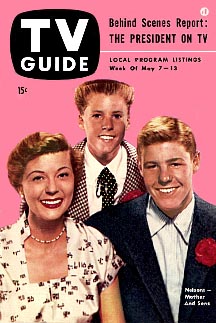
It's been said that the Nelson brothers learned their craft on the job; as it was for Ricky the musician, so it was for David the actor. A role in Peyton Place, the star-studded soaper that ruled the box office for many weeks after its December 1957 release, led to several more film roles over the next few years and steady work for David well after the O&H TV series ended...which wasn't for quite some time. Meanwhile, as the musical preferences of America's youth gained momentum, little brother scored a coup previously unheard-of by anyone but the "Big E." In January 1958 his first album, Ricky, reached number one on the Billboard album chart, a rare achievement in those days for anyone even remotely rock and roll.
"Stood Up" was a hot track in the hands of Ricky and his band; written by country composer Dub Dickerson and Erma Herrold (furthering the significant emergence of female songwriters in rock music), it was the biggest hit yet for Ricky, making it to number two (held back by Danny and the Juniors' "At the Hop," 1958's biggest single). Frantic flip "Waitin' in School," penned by brothers Johnny and Dorsey Burnette, was also a hit. The Johnny Burnette Trio, inexplicably hitless with any of their wildly rocking singles on Coral, had an outlet for their work in Nelson; Johnny and Dorsey supplied him with his next big one, "Believe What You Say," backed with "My Bucket's Got a Hole in It," a 1920s rural standard (credited to jazz musician Clarence Williams) made popular nine years earlier by Hank Williams.
Television's main music video idol scored his first chart-topping single that summer with "Poor Little Fool," a song by 18-year-old Sharon Sheeley, who went on to write hits for boyfriend Eddie Cochran, "Little Miss Dynamite" Brenda Lee and others. With a hole in his bucket and a number one smash in his pocket, Ricky could afford to spend a little time in "Lonesome Town," a double-sided top ten hit with "I Got a Feeling," both written by Baker Knight, a friend of Sharon's and a singer who'd recorded for Decca with his band The Knightmares; in the long run he had to accept being a successful songwriter for artists like Ray Peterson and Elvis (both hit with "The Wonder of You"), Dean Martin and several top-flight country acts. All of Nelson's 1959 hits, in fact, were composed either by a Burnette brother (Dorsey's "Never Be Anyone Else But You" and "It's Late," Johnny's "Just a Little Too Much") or Baker Knight ("Sweeter Than You," "I Wanna Be Loved" and "Mighty Good").
By this time there had been some changes in the band; James Burton moved to lead guitar and Ricky took his place on rhythm. The movie career kicked in with a major role in 1959's all-star John Wayne western Rio Bravo, directed by Howard Hawks. In one scene, Ricky sang "My Rifle, My Pony and Me" and "Cindy" with Dean Martin (and triple-Oscar winner Walter Brennan putting in his two cents and handy harmonica); all good fun and good enough to land Ricky a Golden Globe nomination for Most Promising Newcomer, Male. Another big studio pic followed in 1960 with Ricky and Jack Lemmon sharing lead billing in The Wackiest Ship in the Army. A softer side emerged with hit singles like "Young Emotions," "I'm Not Afraid" and "You Are the Only One," though none were able to reach the top ten level of earlier uptempo efforts.
In a development destined to be repeated, David Nelson wed actress June Blair and the real-life marriage became part of the comedy series...or should I say reality show! Ricky's run on the charts, in the meantime, hit its peak just as he turned 21 with "Travelin' Man," a number one hit in May 1961. A contribution from singer-songwriter Jerry Fuller, the song ranks as Ricky's all-time biggest hit and hottest two-sider, as the flip, Gene Pitney's "Hello Mary Lou," also went top ten. With adulthood official, he decided to permanently shorten his name to Rick Nelson. Fuller's material became a priority resulting in three more hits, "A Wonder Like You" and top tens "Young World" and "It's Up to You." As the TV series entered its tenth season, a remake of Dave Burgess and the Chimes' "Everlovin'" (from '59) was a hit for Rick as well.
In 1962, Decca Records made Rick an offer Imperial head Lew Chudd couldn't compete with: a million bucks guaranteed. Ozzie coordinated the deal and Rick signed with the larger label, taking his band (Burton, Frost, Garf and others) with him. Little changed from their point of view; they continued laying down tracks at United Western Recorders on Sunset Boulevard in Hollywood, the same place where most of the Imperial sides originated. The first Decca single, "You Don't Love Me Anymore (And I Can Tell)" (by songwriting hopeful Nicollette Tady), backed with Ray Charles' classic "I Got a Woman," sold below expectations (longtime labelmate Fats Domino, who left Imperial for ABC-Paramount around the same time, experienced a similar problem). Rick's rendition of the Jimmy Duncan-Bobby Doyle song "String Along," an improvement over Fabian's 1960 version, reached the top 40 in June '63; Imperial continued putting out older Nelson recordings on 45s including all-time fan favorite "That's All," an Alan Brandt-Bob Haymes jazz ballad recorded in 1959.
And the Nelson dynasty kept growing: Rick married Kristin Harmon, a member of another famous family (her dad was football star Tom Harmon and her brother is actor Mark Harmon). Their daughter, Tracy, was born six months after the April 1963 marriage, the tabloid-worthy details kept as hush-hush as possible. Sticking with the previously-set formula/requirement, Kristin was added to the cast of the O&H show despite having no previous acting experience. Rick continued performing his music on the series, the exposure no longer guaranteeing record sales. Regardless, he had a couple of big hits; "Fools Rush In" satisfied Ozzie, a fan of the Johnny Mercer-Rube Bloom tune from 1940 and Rick liked Brook Benton's uptempo 1960 hit version, doing it at the same pace with a country-rock arrangement. "For You," an early 1930s big band song penned by Philadelphians Joe Burke and Al Dubin, went top ten in January 1964. Ray Noble's 1934 smash "The Very Thought of You," as revived by Rick, wound up being his last top 40 hit for more than five years.
Ozzie had directed Rick in a 1961 episode of General Electric Theater titled The Wish Book and in '65 he went another round, directing his son (as "Buzzy") and wife Kristin (as "Rosemary") in a mildly risqué comedy feature, Love? and Kisses!, promoted as "A Rick 'n Roll Riot!!!" Some very good material was recorded in the mid-1960s, yet Rick found himself on a downward spiral he seemed unable to control. Songs like Billy Vera's "Mean Old World" in '65 and Rick's own "You Just Can't Quit" in '66 rank among his best work and are deserving of more than a simple passing grade, but with pop music undergoing a transition to a harder form of rock and soul, it appeared his time may have passed. The Adventures of Ozzie and Harriet, on the other hand, seemed unstoppable. I enjoy seeing the end of many '60s installments that credit the character of "Rick" played by Ricky Nelson...and dig Jimmie Haskell's jazzy piano-and-bass closing theme! The series finally ended its long run in 1966 after 14 seasons and 435 episodes.
Later in the decade he put together The Stone Canyon Band, whose members included former Every Mothers' Son singer-guitarist Dennis Larden and future Eagles bassist Randy Meisner. A remake of Bob Dylan's "She Belongs to Me" hit the charts in the fall of 1969 and gradually worked its way into the top 40, breaking the half-decade drought. "Easy to Be Free," arguably the best of Rick's own compositions, had a respectable chart run in the spring of 1970. These hits revitalized his presence among the new decade's rock acts and kept him touring steadily for several years. A show in New York's Madison Square Garden revealed a longer-haired Rick performing his many hits; when he started in on some of his newer material, the crowd showed its displeasure by booing loudly. His frustrations over the incident came out in a song, "Garden Party" ('...if memories were all I sang, I'd rather drive a truck!'), and its surprise top ten showing in the fall of 1972 gave Nelson the last laugh.
No matter how marginal his acting ability may have appeared, Rick popped up from time to time in made-for-TV movies and in guest roles on cop-and-crime-type shows like McCloud, The Streets of San Francisco, Petrocelli and Owen Marshall, Counselor at Law. Ozzie and Harriet kept going as well, doing some Love American Style segments and an Adventures of O&H sequel, Ozzie's Girls, with Brenda Sykes and Susan Hamilton playing a pair of college girls who rent out the brothers' former bedrooms. The sitcom aired in syndication during the 1973-1974 season; 69-year-old Ozzie Nelson passed away the following year. Rick signed with Epic Records in 1977, his best-known recording for the label a cool remake of Bobby Darin's "Dream Lover" in '79. In the early 1980s he recorded briefly for Capitol.
My own experience with Rick Nelson, backstage in September 1984 when the oldies station I programmed in Portland presented him in concert, was a positive one, though I didn't exactly follow the rules. His manager tried to instill a "walking on eggshells" atmosphere, instructing me to keep my questions during the interview to a minimum. I didn't, of course, and Rick didn't seem to mind; I found him open to talking about anything and everything (though I didn't have the nerve to ask him about his young bride's premature pregnancy!). Having made a connection with one of rock and roll's greatest artists, I was all the more devastated when hearing about his death in a plane crash on December 31, 1985, slightly more than a year later.
The Nelson family remained a presence in the entertainment industry as Rick's daughter Tracy Nelson built a lengthy acting resumé with, among other successes, a starring role in the early-'80s CBS comedy series Square Pegs. Tracy's twin brothers, Matthew and Gunnar, made records under the obvious name Nelson, with a number one hit, "(Can't Live Without Your) Love and Affection," and top ten follow-up, "After the Rain," both in 1990. Harriet Hilliard Nelson lived to age 85 and continued making TV movies and doing guest shots on comedy series; regardless of the quality (or lack thereof) of some of the shows she was on, it was always a pleasure to see her. Harriet's last appearance was on a 1989 episode of granddaughter Tracy's NBC-TV series Father Dowling Mysteries.
NOTABLE SINGLES:
- I'm Walkin' /
A Teenager's Romance - 1957 - You're My One and Only Love - 1957
- Be-Bop Baby /
Have I Told You Lately That I Love You? - 1957 - Stood Up /
Waitin' in School - 1958 - My Bucket's Got a Hole in It /
Believe What You Say - 1958 - Poor Little Fool /
Don't Leave Me This Way - 1958 - I Got a Feeling /
Lonesome Town - 1958 - Never Be Anyone Else But You /
It's Late - 1959 - Just a Little Too Much /
Sweeter Than You - 1959 - I Wanna Be Loved /
Mighty Good - 1959 - Young Emotions /
Right By My Side - 1960 - I'm Not Afraid /
Yes Sir, That's My Baby - 1960 - You Are the Only One /
Milk Cow Blues - 1961 - Travelin' Man /
Hello Mary Lou - 1961 - A Wonder Like You /
Everlovin' - 1961 - Young World /
Summertime - 1962 - Teen Age Idol /
I've Got My Eyes on You (And I Like What I See) - 1962 - It's Up To You /
I Need You - 1963 - That's All /
I'm in Love Again - 1963 - You Don't Love Me Anymore (And I Can Tell) /
I Got a Woman - 1963 - If You Can't Rock Me /
Old Enough to Love - 1963 - Gypsy Woman/
String Along - 1963 - A Long Vacation - 1963
- There's Not a Minute - 1963
- Fools Rush In /
Down Home - 1963 - Today's Teardrops - 1963
- For You - 1964
- Congratulations - 1964
- The Very Thought of You - 1964
- There's Nothing I Can Say - 1964
- A Happy Guy - 1964
- Mean Old World - 1965
- You Just Can't Quit - 1966
- Take a City Bride - 1967
- She Belongs to Me - 1969
with the Stone Canyon Band - Easy to Be Free - 1970
- I Shall Be Released - 1970
- Garden Party - 1973
with the Stone Canyon Band - Palace Guard - 1973
with the Stone Canyon Band - Dream Lover - 1979


